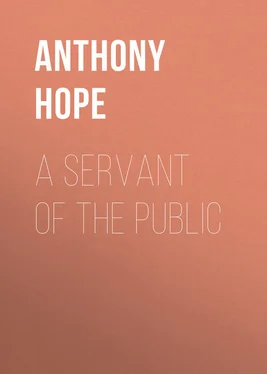Anthony Hope - A Servant of the Public
Здесь есть возможность читать онлайн «Anthony Hope - A Servant of the Public» — ознакомительный отрывок электронной книги совершенно бесплатно, а после прочтения отрывка купить полную версию. В некоторых случаях можно слушать аудио, скачать через торрент в формате fb2 и присутствует краткое содержание. Жанр: foreign_prose, на английском языке. Описание произведения, (предисловие) а так же отзывы посетителей доступны на портале библиотеки ЛибКат.
- Название:A Servant of the Public
- Автор:
- Жанр:
- Год:неизвестен
- ISBN:нет данных
- Рейтинг книги:3 / 5. Голосов: 1
-
Избранное:Добавить в избранное
- Отзывы:
-
Ваша оценка:
- 60
- 1
- 2
- 3
- 4
- 5
A Servant of the Public: краткое содержание, описание и аннотация
Предлагаем к чтению аннотацию, описание, краткое содержание или предисловие (зависит от того, что написал сам автор книги «A Servant of the Public»). Если вы не нашли необходимую информацию о книге — напишите в комментариях, мы постараемся отыскать её.
A Servant of the Public — читать онлайн ознакомительный отрывок
Ниже представлен текст книги, разбитый по страницам. Система сохранения места последней прочитанной страницы, позволяет с удобством читать онлайн бесплатно книгу «A Servant of the Public», без необходимости каждый раз заново искать на чём Вы остановились. Поставьте закладку, и сможете в любой момент перейти на страницу, на которой закончили чтение.
Интервал:
Закладка:
She had been gazing across the stream, at the meadows and the cattle. Now her eyes returned to him and, meeting his glance, she laughed again in that half-amused, half-embarrassed way.
"Shall I make up a life for you?" he asked. "Listen now. You weren't pretty as a young girl; you were considered very naughty, rather good-for-nothing; I think they were a bit down on you, tried to drill you into being like other people, to – what's the word? – eradicate your faults, to give you the virtues. All that made you rather unhappy; you'd a good deal rather have been petted. But you weren't drilled, your faults weren't eradicated, you never got the virtues."
She was listening with a smile and amused eyes.
"The training broke down because you began to grow beautiful and coaxing; they couldn't drill you any more; it wasn't in their hearts. They began to see that they'd got something uncommon; or perhaps they just despaired. They said it was Ora's way. – "
"Lizzie's way," she corrected with a merry nod.
"Oh, no. Hang Lizzie! They said it was Ora's way, and that it was no use bullying the girl. Your father said it first and had some trouble in convincing your mother. But he did at last. Then you grew up, and everybody made love to you. And I expect somebody died and home wasn't so comfortable. So some time or other you took a flight away, and the stage became a reality. I suppose it had been a dream. And at some time or other you took a certain step. Then I don't know anything more except what's written in the Chronicles of Queen Ora Pinsent." He ended the story, which had been punctuated by pauses in which he gathered fresh information from her face.
"You've done well to find out so much. It wasn't very unlike that. Now tell me the future. What's going to happen to me?"
"You're going to be young and beautiful for ever and ever."
She laughed joyfully.
"Oh, yes!" she cried. "Let me see. I shall be young – young enough – for ten years more, and with the proper appliances beautiful for twenty."
His laugh was reluctant; the mention of the proper appliances jarred on him a little. She saw it in an instant and answered with a defiance: "I rouge now when I want it."
"Are you rouged to-day?"
"You can look and see."
"I can look, but perhaps I can't see."
She rubbed her cheek hard with her hand and then showed him the palm.
"I hope that's proof," he said, "but these contrivances are so cunning now-a-days."
"Men think them even more cunning than they are," laughed Ora. "And what have you done?" she went on. "What's your life been?"
"The deplorably usual – preparatory school, public school, Oxford, Bar. I'm a full-blown specimen of the ordinary Englishman of the professional classes."
"And what are you going to do?"
"Oh, I'm sure I don't know. As little work as I must and as little harm as I can, I suppose."
She laughed as she said: "At any rate you aren't doing much work to-day, are you? And no harm at all! But you've left out what you put in for me – a certain step."
"Well, you've taken it, and I haven't."
"You will. Oh, Irene Kilnorton has told me all about it. It seems you can't help it, Mr. Mead. I liked her; I asked her to come and see me, but she's never been."
He made a little grimace, wrinkling brow and nose. Ora laughed again. "You won't be able to help it," she declared, nodding her head. "And then no more Sundays out with actresses!"
"Even as matters stand, it's not a habit of mine," he protested.
She smoked a cigarette of his, investing the act of luxury with a grace which made it meritorious; as she blew out the last of the smoke, she sighed, saying,
"I wish to-day would last for ever."
"Do you?" he asked in a low voice. The tone startled her to a sudden quick glance at his face. Her words had given expression to his longing that this simple perfection of existence should never pass.
"Just the meadows, and the river, and the sunshine."
"You leave me out?"
"No," she said, "you may be somewhere in it, if you like. Because if nothing was going to change, I shouldn't change either; and I like you being here now, so I should like you being here always."
"Do you always expect to change to people?"
"It's not altogether me. They change to me, I think."
"If I don't change to you, will you promise not to change to me?" He laughed as he spoke, but he looked at her intently. She turned away, saying,
"I should be rather afraid never to change to a person. It would make him mean so terribly much to one, wouldn't it?"
"But you married?" he whispered, whether in seriousness or in mockery he himself could hardly tell.
"Yes," she said. She seemed to agree that there was a puzzle, but to be unable to give any explanation of it. The fact was there, not to be mended by theorising about it.
In long intimate talk the hours were wearing away. His impulse was delicately to press her to reveal herself, to shew her mind, her way of thought, her disposition towards him. But side by side with his interest came the growing charm of her; he hardly knew whether to talk to her or to be silent with her, to elicit and trace the changes animation made, or to admire the dainty beauty of her features in repose. Movement and rest alike became her so well that to drive out either for the other seemed a gain burdened with an equal loss; her quick transitions from expression to expression were ruthless as well as bountiful. She appeared very happy, forgetful now of the puzzle that he had called to her mind, of the distrust that had afflicted her, entirely given over to the pleasure of living and of being there. Then she liked him; he was no jar, no unwelcome element. But there was still a distance between them, marked by her occasional nervousness, her ignoring of a remark that pressed her too closely, her skirting round topics which threatened to prove too serious. She seemed to ask him not to compel her to any issue, not to make her face any questions or attempt any determination, to let her go on being happy as long as might be possible without driving her to ask why she was happy or how long she would be. Happy she was; as they rose reluctantly to go back to the inn she turned to him, saying:
"I shall never forget the day you've given me."
But, arrived at the inn, she forgot her love of the meadows. Now she was glad to be in the snug parlour, glad dinner was near, glad to sit in a chair again. She went upstairs under the escort of the questioning admiring landlady, and came down fresh and radiant. In passing she gave him her hand, still cool and moist from water. "Isn't that nice?" she asked, and laughed merrily when he answered, "Oh, well, nice enough." The window opened on a little garden; she flung it wide. "There's nobody to spy on how much we eat," she said, "and the evening smells sweet. Oh, do let's begin!" And she clapped her hands when the meal came. Ashley found a sort of pity mingling with his other feelings for her, compassion for the simplicity and readiness of emotion which expose their possessor to so many chances of sorrow as well as to a certainty of recurrent joys. But he fell in with her mood and they joined in a childish pretence that they were at a great banquet, dignifying the simple chicken with titles they recollected from menu or constructed from imagination, while the claret, which could make no great claims on intrinsic merit, became a succession of costly vintages, and the fictitious bill, by which she declared she would measure his devotion to her, grew by leaps and bounds. It was strange to realise that in twenty-four hours she would be back in her theatre, a great, at least a notorious, personage, talked of, stared at, canvassed, blamed, admired, the life she herself made so simple a thing given over to a thousand others for their pleasure and curiosity. A touch of jealousy made itself felt in his reflexions.
Читать дальшеИнтервал:
Закладка:
Похожие книги на «A Servant of the Public»
Представляем Вашему вниманию похожие книги на «A Servant of the Public» списком для выбора. Мы отобрали схожую по названию и смыслу литературу в надежде предоставить читателям больше вариантов отыскать новые, интересные, ещё непрочитанные произведения.
Обсуждение, отзывы о книге «A Servant of the Public» и просто собственные мнения читателей. Оставьте ваши комментарии, напишите, что Вы думаете о произведении, его смысле или главных героях. Укажите что конкретно понравилось, а что нет, и почему Вы так считаете.












